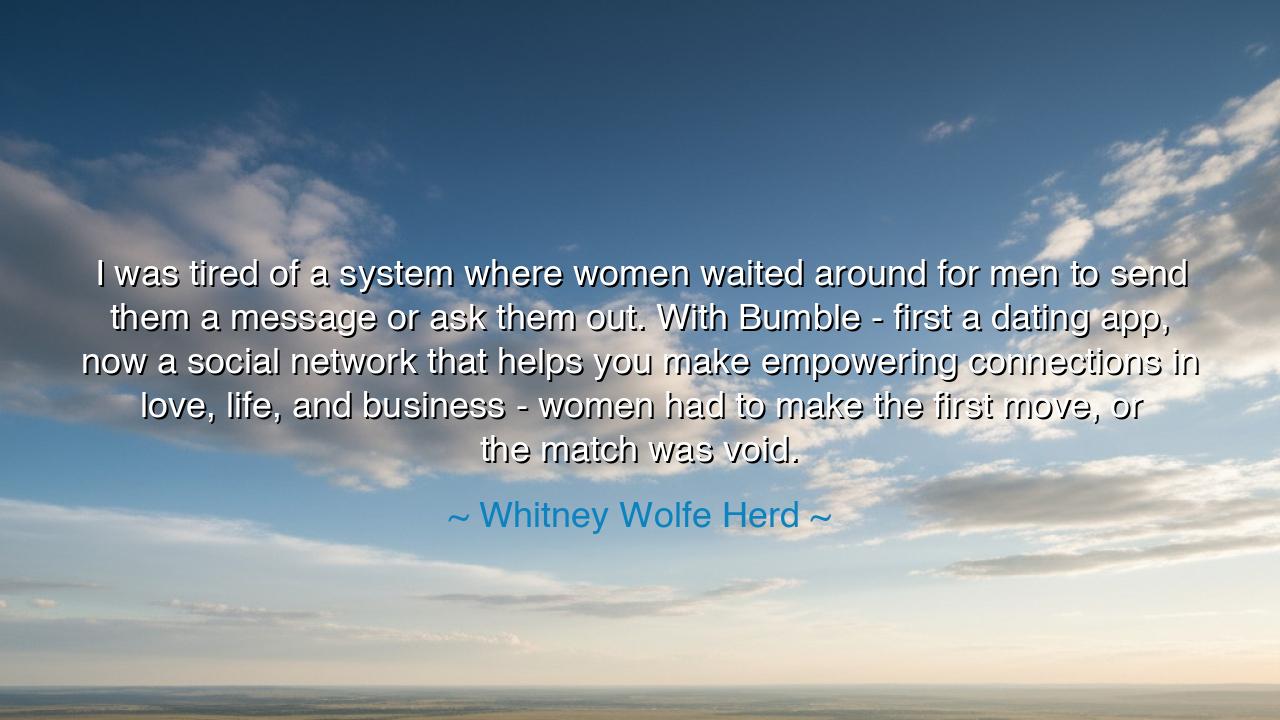
I was tired of a system where women waited around for men to send
I was tired of a system where women waited around for men to send them a message or ask them out. With Bumble - first a dating app, now a social network that helps you make empowering connections in love, life, and business - women had to make the first move, or the match was void.






In the marketplaces of the heart, where promises are traded like spices and glances, a reformer rose and spoke: “I was tired of a system where women waited around for men to send them a message or ask them out.” Thus declared Whitney Wolfe Herd, and she set her hand to the loom of custom. From her workshop came Bumble—first a dating app, then a social network—a city of bright gates where women must make the first move, and where a silent pairing dissolves, its match made void, if no voice steps forward. Hear the principle behind the tool: architecture is argument. Set the hinges differently, and the door of culture swings another way.
What is the meaning of this decree that the first move belongs to her? It is not a mere reversal for sport, but a schooling in agency, consent, and the choreography of respect. When a platform requires a woman’s initiation, it engraves a lesson into the stone of habit: that desire may be active, not just reactive; that dignity is not the absence of risk, but the presence of boundaries chosen. A world that once praised patience in the porch now teaches empowering connections—in love, in life, in business—where voice precedes vulnerability, and intention precedes intimacy.
Consider the origin of such an ethic. The founder had walked the old roads where the loudest caller won the square, where the uninvited message was both currency and clamor. She did not abandon the square; she replanned it. By coding women’s speech as the threshold event, she turned etiquette into infrastructure. What mothers once told daughters in whispers—“choose whom you answer”—became a rule of the realm: without her word, the bond is void. Thus design becomes doctrine, and doctrine becomes daily bread.
History hints that this inversion has old roots. In 1937, the comic strip that birthed the Sadie Hawkins dance gave North American towns an annual ritual in which girls asked boys—jest to some, justice to others. Older still, the leap-day custom in parts of Ireland and Scotland let women propose marriage, a folklore valve releasing pressure in the pipes of tradition. These spectacles were brief candles; Bumble set a lantern on a pole and left it burning: not a day, but a default; not a joke, but a jurisprudence of courtship.
Take a humbler, modern tale for your satchel. Leena, moving to a new city, carried the ash of old disappointments—the lingering bruise of waiting. On Bumble, the law was plain: speak or let the match fade to air. She crafted one line that felt like her—curious, kind, unafraid—and sent it to three strangers whose profiles signaled depth. One replied with care, one with humor, one not at all; yet in each outcome she felt the spine rise. Months later, the one with care became a steady presence, not because an algorithm decreed it, but because she had practiced the muscle of initiative. The tool did not conjure destiny; it trained her courage.
Let us draw the lesson like water from a deep well. Waiting can be a virtue when it is chosen; it becomes a chain when it is assigned. To call a dating app or social network feminist is to bind its stones to equity: prioritize safety without apology, center consent without coyness, and measure success not by the noise of matches but by the quiet of mutual respect. When the first move is both welcomed and expected, we raise a generation that treats attention as a gift, not a tax; conversation as a craft, not a hunt.
Now, take up practical counsel as one takes up seed and plow. If you are a seeker: write a living opening—one question, one observation, one boundary—and send it without trembling; let the match be void rather than your values. If you are a maker: surface safety tools first, not last; design for exit as well as entry; reward kindness as you reward engagement. If you are a mentor: teach daughters and sons to invite, decline, and withdraw with clarity. If you are a leader in business: let networking platforms echo the same ethic—reach out with purpose, reply with care, and end a thread with grace when it no longer serves. In all this, remember: initiative is a lamp you can carry, and the road brightens wherever you walk.
So let this be passed down: the old system asked women to wait; the new covenant asks all of us to speak truly. Bumble was an early banner in this field, proof that code can carry conscience, that empowering connections are not accidents but architectures. Build such houses in love, life, and business, and the night will hold fewer shadows; the morning will find you already moving, already choosing, already free.






AAdministratorAdministrator
Welcome, honored guests. Please leave a comment, we will respond soon